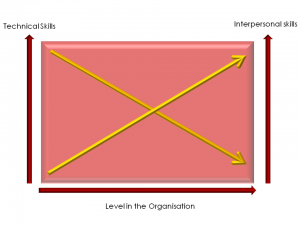Soft skills are hard – but really, really important.
I’ve heard the term ‘soft skills’ used in a derogatory fashion for many years in Management and they are often looked at as “something for other people (like HR) but not for me as an outcome-focused, results-driven Manager”
The reality is that the higher you are in an organisation the more you need ‘soft’ skills’ as the results you desire, are more and more, delivered by people other than yourself.
Therefore, the ability to get the best out of your team becomes much more important than your ability to do the task your team do.

So what are ‘Soft’ Skills?
Most people list communication skills, leadership skills, team building, self-motivation, decision making and problem-solving among the soft skills.
The problem is developing these skills can be hard and applying these skills consistently, especially in the face of pressure, is extremely difficult.
Developing these skills can take a lot of training, coaching and mentoring as well as conscious application, practice, and experience.
There are some crucial skills you will need to improve your performance and the good news is that these will inform and help you become much more effective with your interpersonal skills.
These include:
Rapport building – people buy from people. Relationships and respect are crucial to help you lead others.
Goal setting – setting goals effectively is critical to achievement. SMART goals are often ineffective so finding a new way to set goals and targets is really important.
Empathy – putting yourself effectively in other people’s shoes helps you gain an understanding to help you get the best out of people.
Flexibility in your behaviour – different people need to be communicated with, motivated and supported in different ways. If all you have is a hammer, everything looks like a nail. You need more tools in your toolbox.
How do you get these skills?
NLP (Neuro-Linguistic Programming) can give you those skills. NLP has had a bad press over the years, with people saying things like “NLP has shamelessly stolen from other modalities like CBT.” – It has.
People also say “there is nothing new in NLP” – there isn’t.
I’ve heard people describe it as “just west coast psychobabble” – it isn’t.
NLP is: A pragmatic set of tools and techniques that can help you dramatically improve your interpersonal skills by giving you those crucial underpinning skills that help you to operate effectively in the key areas of business without having to do a huge amount of training and learning.
I’ve been delivering NLP training for the last 22 years, focusing on helping people in a business environment improve their interpersonal skills. Over 700 people have completed my NLP Business Practitioner course and I’ve had massive amounts of positive feedback for NLP from a wide range of people ranging from Sales, HR, Manufacturing managers, Engineers, Chemists, Doctors, Dentists and many others who have called the training life changing, helping them to dramatically improve their interpersonal skills so that the higher they rise in an organisation, the more effective they can be without doing lots of add on training.
If you’d like to rise in your organisation, improve your Interpersonal Skills.
For more information – click here
